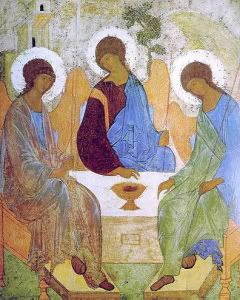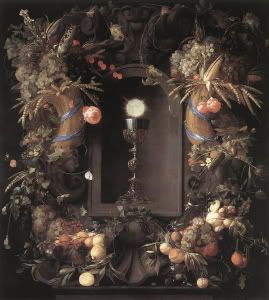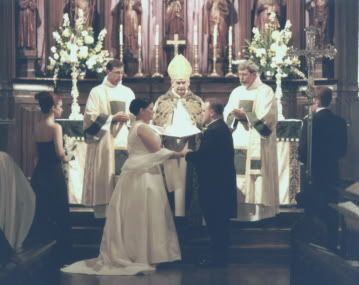 Homily on the Most Holy Trinity
Homily on the Most Holy Trinityby The Rev’d Timothy M. Matkin, SSC
Given at S. Alban’s Church, Arlington, TX on 22 May 2005
In the Name of the Father, and of the Son, and of the Holy Spirit. Amen.
The year was AD 325 and Christian bishops from all over the known world were gathered to take council for the church in the resort town of Nicaea. They were called together by Constantine, the first Christian Emperor. Constantine’s aim was to unite the empire and a key part of that strategy was to have a united church—which was not a problem, until . . . a priest in Alexandria, Egypt named Arius started making a pronouncement from the pulpit that “there once was a time when Christ was not.”
Arius taught that there was not always a co-eternal Son of God. His teaching was that Jesus was the most exalted of all God’s creatures, whom God anointed with the Spirit at baptism and adopted as a son. He said Jesus is inferior to God, that he is not “God the Son.” Jesus is of a different substance, not fully divine.
The bishops had come to Nicaea to sort out the matter. At one point, the conversation got so heated that the saintly bishop of Myra in Turkey, named Nicholas (of Santa Claus fame), who was known for his kindness and generosity, walked over to Arius and punched him out. The story goes that Nicholas was immediately deposed for such unruly conduct, but the council restored him the next day when several of the bishops had a dream about Nicholas being returned to his episcopal throne.
What would bring such indignation out of such a gentle man as Nicholas? What made old Saint Nick loose his cool? Why was he so upset? Did it really matter what Arius was saying? Indeed, it does matter, for sometimes even words can destroy souls. The Apostle Paul wrote to S. Timothy, “
Watch your life and doctrine closely. Keep doing this, for by doing so, you save both yourself and those who listen to you” (1 Tm 4:16-17).
Today is the feast we call Trinity Sunday. At the end of the incarnation (Christmas) and redemption (Easter) cycles of the Church kalendar, we pause to give thanks and embrace our heritage of faith, our faith in and worship of the one true God—the Holy and undivided Trinity: God the Father, God the Son, God the Holy Spirit.
In the older prayer books, there was a creed called the
Quincunque vult, proscribed to be read on Trinity Sunday and at one of the minor offices called Prime. In some places, they sing this creed in procession today. It was named after S. Athanasius, one of the great defenders of the orthodox trinitarian faith, who fought for the truth even through great personal hardship.
This “Athanasian Creed” is found on p. 864 of the current
Book of Common Prayer. It is a creed of that mainly speaks about the Trinity—and in great detail. Like the indignant Nicholas at the council, it is very serious-minded. In the first line, we read: “
Whosoever will be saved, before all things it is necessary that he hold the Catholic Faith. Which Faith everyone do keep whole and undefiled, without doubt, he shall perish everlastingly. And the Catholic Faith is this: that we worship one God in Trinity, and Trinity in Unity, neither confounding the Persons, nor dividing the Substance.”
Why is it so important to keep the Catholic Faith whole, pure, and undefiled. Why is this so serious? First, understand that we know and identify God by his attributes. God has revealed to us certain things about himself. From the record of the Scriptures, we know that God is a personal God, that he is almighty and just, that he is also merciful, and that in the truest sense, God is love. There we also read that God revealed himself as Father, that he used his Word and Spirit in the act of creation. In the Scriptures, we see God has revealed to us his name—YHWH. God names his only Son Jesus, which means “YHWH is salvation.”
In the New Testament, we learn that God so loved the world, that he gave his only begotten Son for us and to us. The Word was incarnate and dwelt among us. Jesus is the perfect
ikon of the Father, full of grace and truth. Jesus fulfilled the law and bore our sins on the cross. He rose victorious from the dead and Jesus offers us the same blessing by sacramentally joining us to himself as his mystical Body through the new birth of Baptism and the Eucharistic feast. When Jesus rose into heaven, taking our humanity into God, he did not leave us comfortless, but sent the Holy Spirit into our hearts crying, “Abba, Father.”
The one God exists in three Persons who are co-equal and co-eternal. From this we learn that in his deepest mystery, God is not a solitude, but a family. He is a family of infinite intimacy. It is in his nature to create, to go out of himself, and to make that creation a gift to himself in return. Such is the action of worship in the Holy Eucharist. It is at the Altar that we share most directly in the divine life of the Holy Trinity.
We know who God is and what he has done by his own self-revelation. That’s why we can be confident that we are not worshipping a false god, an idol, or a god that is simply the projection of our own selves. A god other than the Holy Trinity is simply no god at all. Such a god has no power to create, no power to forgive, no power to heal, no power to restore, and should never be worshipped. To distinguish YHWH from foreign idols, the Israelites sometimes referred to him as the “living God,” which is to say, he is the only God who exists.
It is only through this one, true, and living God that we find salvation. Stressing that point, S. Paul wrote to the Galatians, “I am astonished that you are so quickly deserting him who called you into the grace of Christ and are turning to a different gospel. . . . Even if we, or an angel from heaven, should preach to you a gospel which is different from the one we have been preaching, let
him be anathema. As we have said before, so now I say again: if anyone is preaching to you a gospel contrary to the one you received,
let him be anathema” (Gal 1:6-9).
S. Paul goes so far as to give them back-to-back warnings that some false doctrine can be soul-destroying. Arius was not merely tearing at the unity of the Church with his preaching, he was also destroying souls. In the creedal affirmation put forth at the end of the first Ecumenical Council, the Nicene Fathers rejected Arius’ idea that Jesus was an exalted creature, merely our ethical example, an earthly messiah, inferior to the Father. A Jesus that is not divine has no ability to be our Savior.
Drawing from the scriptures and relying on the promise of Jesus that the Spirit would lead the apostles as a body and guide them into all truth, they affirmed, “We believe in one Lord, Jesus Christ, the Son of God, only-begotten of the Substance of the Father. God from God, Light from Light, true God from true God, begotten, not made,
being of one Substance with the Father.”
At the end of their doctrinal affirmation, the Fathers went on to say,
And those who say, “There was a time when he was not,” and, “Before he was begotten he was not,” and that, “He came into being from what is not,” or those who allege, that the son of God is “of another substance or essence”, or that he is “created” or “changeable,” these the Catholic and Apostolic Church declares anathema.
They didn’t have the political concern that Constantine did. But when the bishops in council saw the damage to souls from not being clear about those preaching a different gospel and proclaiming a different God, not the holy Trinity—they were all just as indignant as Nicholas.
What is the lesson to us today from the councils of the church that defined and defended the Christian concept of God as Trinity? I see two.
First, as the Apostle Paul said, “Watch your life and doctrine closely. Keep doing this, for by doing so, you save both yourself and those who listen to you” (1 Tm 4:16-17). Let us become so familiar with who God is and what he is like, that we instantly recognize when someone tries to pass us a counterfeit.
When we hear someone talk about the persons of the Trinity as different “aspects of God,” when we hear that “the Father came down to be one of us,” or “Jesus is simply God the Father with skin on,” or that Jesus was merely a human being, or that he only appeared to be human, or that Jesus became God at his birth or his baptism, or stopped being God on the cross, or that diversity is what makes God a trinity, or that the Holy Spirit is an “it” —a thing, or that you and I are little gods or “gods-in-embryo,” then we should not pay attention to anything else they have to say. For these are the beginning of errors, not the end. And sometimes words can destroy souls.
Second, let us have faith that God will preserve the Faith "once delivered to the saints" in his holy Church. Arianism was the most destructive heresy to ever rise in the Church. The bishops thought it was all over at Nicaea, only to see the heresy morph into other forms. Just when they thought it was over, an Arian would become emperor and Arian bishops would be appointed. It is said that at one point, over 80% of the Church was Arian and the orthodox bishops and others Christians were persecuted as enemies of both Church and state.
But Christ built his Church on a rock, the gates of hell never to prevail against it. They would not prevail then, and they will not prevail now. Why? Christ promised that the spirit would lead us into all truth. Deception, confusion, and misunderstanding are overcome by the Truth of God as revealed in his holy Word.
At times, it may seem that confusion and false teaching have won the day. Theological and moral truths seem to be perpetually eroding in our society and even within the Church. But the Faith is still with us. God’s light will never be snuffed out. The Lord has always made provision for a faithful remnant of his people. It is our responsibility to remain faithful to him who has remained so faithful to us. Draw close to the Lord and he will draw near to you. In the hour of trial, turn to him for strength, and you will find the victory that overcomes the world.
Let us pray.
Almighty God, keep your people faithful in all our teaching and practice: faithful to the Fatherhood of God, faithful to the brotherhood of Christ, and faithful to the indwelling presence of the Holy Spirit. Keep us steadfast in this faith and worship. For yours is the majesty, O Father, Son, and Holy Spirit, yours is the kingdom, and the power and the glory, now and for ever. Amen.





